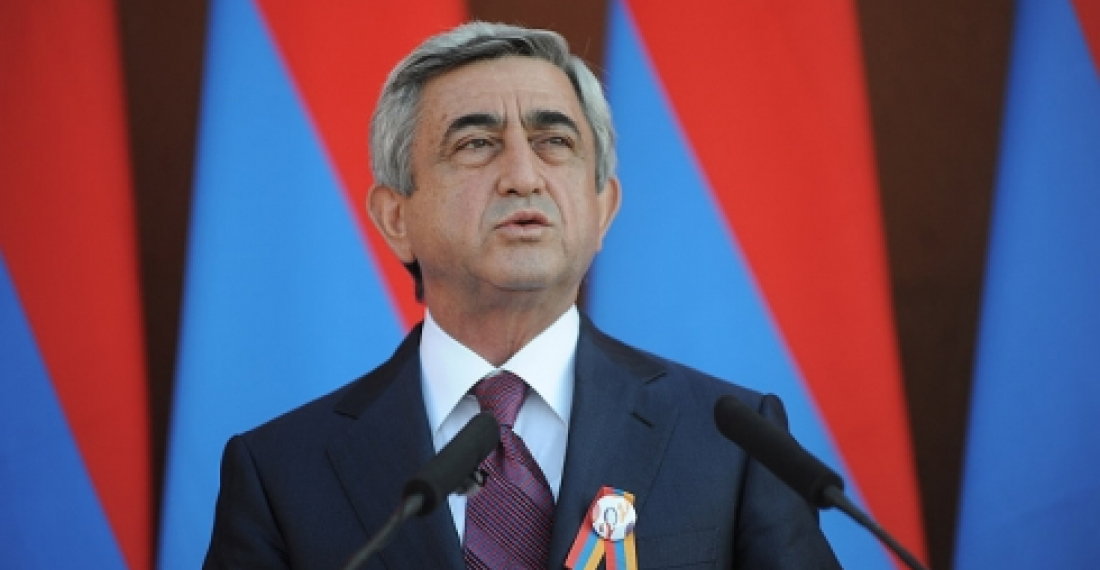I am glad to welcome you to the Presidential Palace, welcome you to Armenia. OSCE is a very important organization for Armenia not only because this Organization has in its framework several institutions - the Minsk Group, the High-level Planning Group, the OSCE Chairman-in-Office Personal Representative - all of them dealing with the Nagorno Karabakh problem, but also because the OSCE principles and the
comprehensive concept of security is fully shared by our country. It is very important that in the framework of this Organization, we agreed that security of one country cannot be ensured at the expense of security of another country. We fully implement our commitments. However, recently an event has taken place, which makes us to seriously reconsider some of our approaches. As you know, in Azerbaijan pardon was immediately granted to a creature which committed a horrendous crime; unfortunately, in our view this event was not the last one. Everything started when in 2007 the OSCE Minsk Group presented its proposal for the settlement of the Nagorno Karabakh conflict. Many would remember how Azerbaijan rejected the document; then it made a declarative statement that the document in general was acceptable, but afterwards it was trying to give its own interpretations to the principles enshrined in the document. You remember how they were trying to interpret the right of self-determination. You remember how they were trying to interpret the term "referendum." And then a spectacle started which was meant to gain time, to accumulate huge amount of weaponry so that at the opportune moment the Nagorno Karabakh conflict could be solved through the military means.
In our view, pardoning a murderer was not a step to raise Aliev's authority at home - it was an attempt to test the response of the international community to Azerbaijan's outrageous moves. Cannot be any other way because in Azerbaijan and among its leadership, there are, I believe, many people who could soberly see the consequences of such a move. And that testing of the international community's patience, as I said, has started long ago: when Azeris started to violate the CFT treaty obligations, nobody responded to those blatant violations; when Azeri president publicly instructed his Academia to write a history for Azerbaijan where Armenians must not
be mentioned at all, nobody paid attention; when Aliev stated publicly that Yerevan and the entire territory of Armenia is the Azeri soil, nobody reacted to that; when Aliev declared publicly that their number one enemy is the Armenian nation world-wide and that the enemy must be destroyed, again there was no retort. In response to all our warnings, all requests we have made to the Co-chairs, to the rest of the world that it was a beginning of a very dangerous process we were receiving improper responses that Aliev's statements were for domestic consumption. Such a differentiation between the domestic and external audiences simply cannot be - a person cannot think one way in the morning, and another in the evening; one way on Monday, and another way on Thursday. Seeing such a lenience toward these statements, Aliev took up actions. The first one took place during the regional visit of the US Secretary of State: subversive actions were instigated not only on the line of contact but also at the Armenian-Azerbaijani border. And again the response was a weak one. And unfortunately, this is not the end of it.
You know, I went through the war, that's why I don't want a new war. I personally felt on my own skin what the effects of the war, its
impact. And I am confident that anyone concerned with security in our region, doesn't want a war. However, desiring is not enough -
actions are needed and that actions must start when you call spade a spade. The so called "diplomatic correctness" in this case is simply
detrimental for the security of this region.
Recently, in Armenia a sarcastic joke appeared. It sounds like this: after these events, the international X organization calls upon Armenia and Azerbaijan not to axe each other in sleep. And this is not a joke to cheer you up, this is our people's attitude towards those international organizations which are trying to introduce parity between the victim and the perpetrator; between the guilty and the innocent. It is extremely bad. I ask you, I urge your governments and our Organization to deal with this issue.
President of Armenia: The so called "diplomatic correctness" in this case is simply detrimental for the security of this region
President of Armenia: The so called "diplomatic correctness" in this case is simply detrimental for the security of this region







